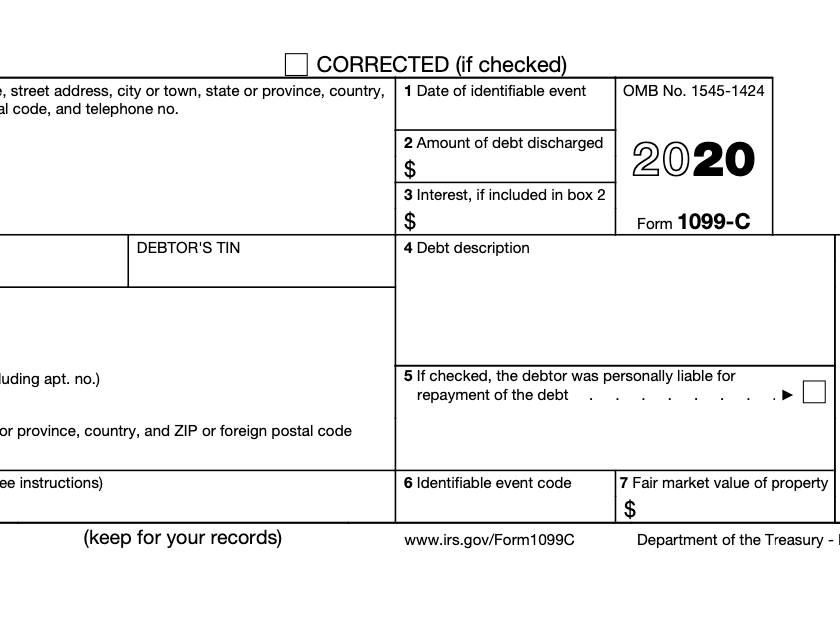The IRS considers any forgiven debt as a source of income, of which you have to pay taxes on? You have probably been surprised with the receipt of a Form 1099-C in the mail during tax season if you have ever settled any given debt entirely, or for less than originally owed. You shouldn’t stress over a 1099-C over the cancellation of debt. While you may be able to avoid paying taxes on canceled debt all together, a few exclusions may apply. We have gathered information about canceled debt, as well as the tax burden incurred
What is a Form 1099-C?
A Cancellation of Debt Income, or CODI, is reported to the IRS through a 1099-C. When a debt is canceled, discharged or forgiven, you must include the amount canceled in your gross income, and pay taxes on said income – unless you qualify for an exception or exclusion. In the case where a creditor forgives $600 of debt, or more, you are required to file a Form 1099-C.
What Should be Done Upon Receipt of a 1099-C?
It’s unwise to ever ignore a canceled debt, or receipt of a 1099-C, especially since the IRS expects to have that specific income included within your return – unless there is an exclusion or exception. You should also track canceled debt, even if you didn’t receive a 1099-C. The receipt of a 1099-C is no indicator of validity, as creditors could have submitted the form to the IRS, and you simply never received a copy. Most likely, you still need to claim the income and pay any and all taxes on it.
Once you have confirmed cancellation of debt, you may figure out if you qualify for exclusions or an exception. While it may be difficult to figure out how much you are required to pay, seeking out the advice of a tax professional may be extremely helpful. While you may be used to filing taxes on your own, cancellation of debt can make things complicated. Tax professionals have the knowledge to determine whether you are eligible to reduce the amount of canceled debt for taxes, or skip tax payments on debt cancellations altogether.
How would Canceled Debt be Excluded from Taxable Income?
Canceled debts that are eligible for exclusion from income, that don’t require payments in full or partially, are considered exclusions to cancellations of debt income. These exclusions include:
- Debt canceled in bankruptcy,
- Debt canceled due to inability to pay debts
- Qualified principal residence indebtedness cancellation (before January 1, 2018)
- Qualified farm indebtedness cancellation
- Qualified real property business indebtedness cancellation
Exclusions can only be used once you apply the exceptions. Once you use the exclusions, you most likely have to reduce your tax attributes. If you are confused at this point, especially in regard to debt forgiveness tax, don’t feel alone – this is where we are well-equipped to help.
How to Determine Whether Your Debt Qualifies for 1099-C Exception
It may not be easy to complete and submit Form 982, if you qualify for an exclusion. Reading the title of the form, “Reduction of Tax Attributes Due to Discharge of Indebtedness and Section 1082 Basis Adjustment” alone may feel intimidation. In order to begin, check out two common applicable exclusions.
- Debt canceled as the result of a title 11 bankruptcy case does not require payment if it is discharged successfully in bankruptcy. Title 11 simply refers to a section of the U.S. Code that is referred to as Bankruptcy Code. However, strictly speaking, this does not mean that debts wiped out in Chapter 11 bankruptcy are the only canceled debts to qualify for said exclusion.If you have settle debt, from before filing for bankruptcy, creditors may continue to send you a 1099-C to indicate the forgiven amount. You will need to research exceptions and exclusions that may apply to your particular case, in order to avoid paying taxes on the given amount.
- Debt canceled due to inability to pay is a common exclusion used by taxpayers to avoid paying taxes on canceled debt, along with bankruptcy. You must first make a list of all of your assets and their value, in addition to a list of debts owed. This includes debts that aren’t necessarily dischargeable in bankruptcy – like student loans. If your assets are exceeded by your liabilities, you are considered insolvent.For example, if your assets’ value totals $35,000, and your debt is $45,000, you are considered insolvent for a total of $10,000. Should you be able to settle a debt with a creditor who forgives $8,500, you won’t be required to report any of that money on your tax return as income.Let’s look at another scenario, where your assets are worth $35,000 and debts are $45,000. If the creditor writes of $14,000 of said debt, you won’t be required to report $10,000 of that income – while you are expected to report $4,000 of it on your return. This means filling out Form 982 in order to demonstrate why you aren’t including the amount listed on the 1099-C to the IRS in your taxable income.
What if Taxes were Paid on Debt That was Excluded?
In the case that you paid taxes on debt that was forgiven, you may go back and amend previous year’s tax returns in order to receive a refund. However, it’s important to note that you only have three years to file amended returns in order to get refunded.
Ensure that your adjustment compensates for the appropriate amount of forgiven debt – making sure to explain any claimed exclusions upon refiling. While the IRS does not allow amended tax returns to be e-filed, you will be required to mail the completed paperwork to the IRS directly.
Getting the Help You Deserve With Your Tax Debt
It’s never a good idea to approach complex financial decisions without sound advice from people who really understand the choices you’re weighing. That’s why tax professionals are there, to give you the resources to reach the best possible understanding with the IRS. If you need help with a 1099-C or any additional tax debt relief services, contact us today by phone (1-888-548-0478) or email.


